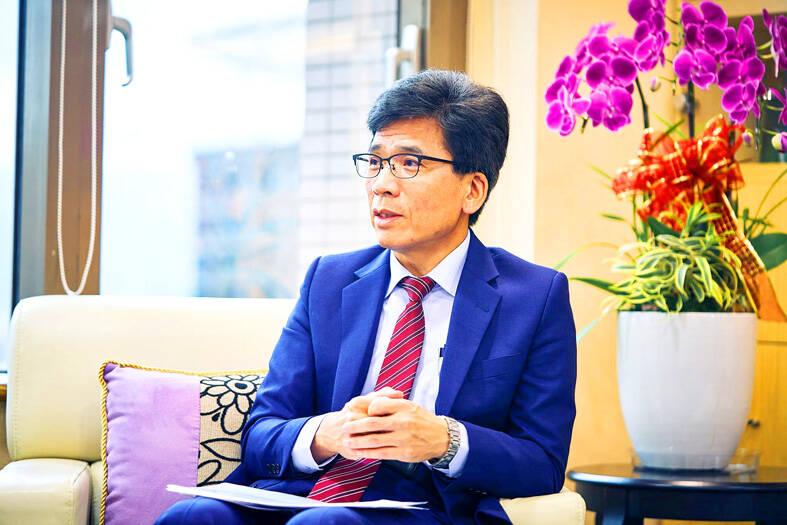Recent sales of stocks by overseas investors are a “short-term phenomenon” that do not represent a bearish view, with foreign holdings having been on an upward trend in the past few years, the Financial Supervisory Commission (FSC) said yesterday.
Foreign investors account for about 42 percent of Taiwan’s stock market, FSC Chairman Peng Jin-lung (彭金隆) said in an interview in Taipei.
That is up from 37.5 percent in 2022, he said.

Photo: An Rong Xu, Bloomberg
“Our total market cap is increasing, and foreigners maintaining their holdings at this level means their investments are increasing,” Peng said. “Are foreign investors retreating from Taiwan? We can’t tell — we only know that trading frequency is increasing.”
The TAIEX has dropped nearly 9 percent from its record close on July 11, with some investors concerned after former US president and Republican presidential candidate Donald Trump cast doubt over his commitment to defending Taiwan.
Still, the index is up about 24 percent this year, as investors pile into its suppliers of advanced computer chips used in everything from smartphones to artificial intelligence (AI).
The FSC is sketching out several scenarios that might emerge from the US election, but declined to elaborate or comment on the parties or candidates, Peng said.
“It’s not about who will win the US election, its about how their future policy could affect our industries,” he said.
Market sentiment that Trump would win back the White House surged earlier this month after an attempted assassination and his formal nomination, but US Vice President Kamala Harris, the likely Democrat nominee, has closed the gap with him in recent polls.
This year’s rally in Taiwan’s market, among the strongest in Asia, has been buoyed mostly by Taiwan Semiconductor Manufacturing Co (TSMC, 台積電), a major supplier of tech giants such as Apple Inc and Nvidia Corp, as well as other semiconductor shares riding on the global AI wave. TSMC alone accounts for 34 percent of the US$2.1 trillion stock market.
“It’s a common concern that our market trading is concentrated in a certain sector [such as chips], but that’s not a rare phenomenon in international markets,” Peng said.
“For example, Samsung is in the same situation in South Korea,” he said.
“There are different perspectives toward TSMC,” Peng said. “Some might be proud of it, some might worry it’s too big. What we hope is to have more companies like it.”

With an approval rating of just two percent, Peruvian President Dina Boluarte might be the world’s most unpopular leader, according to pollsters. Protests greeted her rise to power 29 months ago, and have marked her entire term — joined by assorted scandals, investigations, controversies and a surge in gang violence. The 63-year-old is the target of a dozen probes, including for her alleged failure to declare gifts of luxury jewels and watches, a scandal inevitably dubbed “Rolexgate.” She is also under the microscope for a two-week undeclared absence for nose surgery — which she insists was medical, not cosmetic — and is

CAUTIOUS RECOVERY: While the manufacturing sector returned to growth amid the US-China trade truce, firms remain wary as uncertainty clouds the outlook, the CIER said The local manufacturing sector returned to expansion last month, as the official purchasing managers’ index (PMI) rose 2.1 points to 51.0, driven by a temporary easing in US-China trade tensions, the Chung-Hua Institution for Economic Research (CIER, 中華經濟研究院) said yesterday. The PMI gauges the health of the manufacturing industry, with readings above 50 indicating expansion and those below 50 signaling contraction. “Firms are not as pessimistic as they were in April, but they remain far from optimistic,” CIER president Lien Hsien-ming (連賢明) said at a news conference. The full impact of US tariff decisions is unlikely to become clear until later this month

GROWING CONCERN: Some senior Trump administration officials opposed the UAE expansion over fears that another TSMC project could jeopardize its US investment Taiwan Semiconductor Manufacturing Co (TSMC, 台積電) is evaluating building an advanced production facility in the United Arab Emirates (UAE) and has discussed the possibility with officials in US President Donald Trump’s administration, people familiar with the matter said, in a potentially major bet on the Middle East that would only come to fruition with Washington’s approval. The company has had multiple meetings in the past few months with US Special Envoy to the Middle East Steve Witkoff and officials from MGX, an influential investment vehicle overseen by the UAE president’s brother, the people said. The conversations are a continuation of talks that

CHIP DUTIES: TSMC said it voiced its concerns to Washington about tariffs, telling the US commerce department that it wants ‘fair treatment’ to protect its competitiveness Taiwan Semiconductor Manufacturing Co (TSMC, 台積電) yesterday reiterated robust business prospects for this year as strong artificial intelligence (AI) chip demand from Nvidia Corp and other customers would absorb the impacts of US tariffs. “The impact of tariffs would be indirect, as the custom tax is the importers’ responsibility, not the exporters,” TSMC chairman and chief executive officer C.C. Wei (魏哲家) said at the chipmaker’s annual shareholders’ meeting in Hsinchu City. TSMC’s business could be affected if people become reluctant to buy electronics due to inflated prices, Wei said. In addition, the chipmaker has voiced its concern to the US Department of Commerce